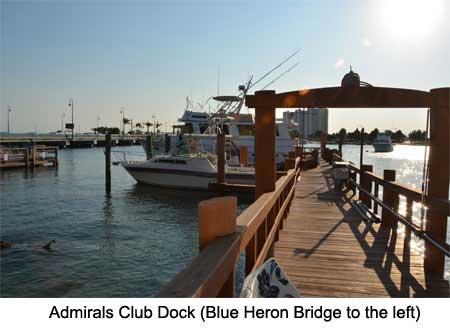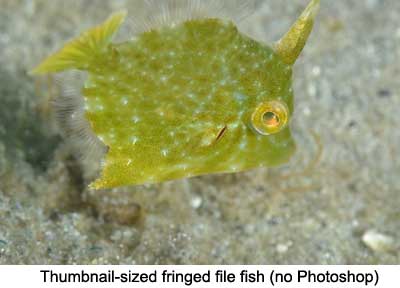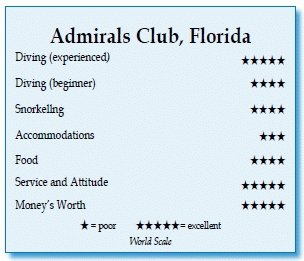Admirals Club, Singer Island, FloridaContents of this Issue: Admirals Club, Singer Island, Florida Send Us Your Reader Reports by November 20 Shore Diving in Intracoastal Tidal Waters Amoray Dive Resort, Key Largo, Florida Bikini Atoll, Hawaii, Raja Ampat… Does This Seattle Diver Deserve Death Threats? Potential Danger with Aqua Lung Weight Pockets Life Insurance for Scuba Divers These High-Pressure Hose Recalls Should Have Divers Concerned Costa Rica’s Shark Finning: Is the Government in Cahoots? Editorial Office: Ben Davison Publisher and Editor Undercurrent 3020 Bridgeway, Suite 102 Sausalito, CA 94965 superb critter diving, trips to the Gulf Stream from the November, 2012 issue of Undercurrent
Dear Fellow Diver: It was night. My mask and snorkel were caught in an invisible web of fishing lines as I spy-hopped to see which pier I was exploring. The wicked combo of the line and the incoming tide was tugging the mask off my face. This is what it's like to get into trouble diving solo, just when you think all is safe. Within minutes of gearing up and walking into Florida's Intracoastal Waterway between the low-slung Blue Heron Bridge and Singer Island, near West Palm Beach, my light attracted a tiny squid. It hung inches from my camera, which allowed clear shots even in the murky waters. I was on a slow stalk less than 15 feet deep. My prowl was rewarded with a number of close-ups as first one, then another mantis shrimp perched at the top of the holes I had scouted out earlier. An ocellate swimming crab assumed a boxer's stance, ready to defend itself. But now I was snagged. Scissors hung off my BCD, and my scallop-bladed knife was chest level. I could detach my snorkel or remove my mask. Finning to hold position, I dangled my camera rig from its strap off an elbow and pushed my wrist through my buoy line holder. Hands freer, I untangled my snorkel and finished the adventure.
The weather was iffy as fringes of Tropical Storm Debby blanketed the area with cloudy skies upon my arrival. While I was sipping sundowners and chatting with Rich on his dock, a manatee broke the water. My mood shifted from contemplative to upbeat.At high tide at noon the next day, I waded in, a mandatory dive buoy in tow. Within the first five feet, a dainty juvenile French angelfish played hide and seek in debris under the dock. A small male planehead filefish shyly provided profiles. As I made my way against the incoming tide toward the bridge's eastern span, big yellowline arrow crabs worked their claws like miniature construction cranes, the span between their pincers a foot or more. Swimming under the bridge, I finned to a submerged piling and spotted an uncommon lined seahorse. My hope for a "new friend," as birders call their initial sighting of a species, had been fulfilled on the first dive. On the way back, with the tide now flowing out and the water becoming more turbid, I photographed delicate, young, black and white highhat juveniles. I emerged after a little over two hours. Back on the dock, rinsing my gear with a freshwater hose, I chuckled at how unlike the Admirals Club is from the hoity-toity image its name conjures. Forget membership fees, stuffed shirts and stiff upper lips. It's an unassuming, pastel green two-floor apartment building with 12 units. Its swimming pool is the Intracoastal Waterway, accessed from a short set of stairs next to its private dock. The person in the apartment next door may be a long-term tenant who works on the island, or someone vacationing with their kids (I was the only diver). Plus, the Admirals Club is strictly self-serve. Rich and Eva only supply salt, pepper, beach/bath towels and paper towels; you bring your own coffee, soap, shampoo and groceries. The Admirals Club has no rinse tanks or drying lockers (although you can leave gear behind a locked gate), but my full bathtub worked fine for that purpose.
After an early dinner, I set out to look for critters at the turn of low tide. Submerging around 6 p.m., visibility was only two to five feet but with much more to see, from my Midwestern freshwater perspective. Using my allpurpose, 60-milimeter macro lens, I got close enough to starfish, porkfish, purple sea urchins, cardinalfish, Caribbean lobsters, sand perch and a thumbnailsized rough box crab to satisfy my quest for decent images, though for some photographers a little Photoshop might be in order here and there. After the first couple of bridge dives, I explored its easternmost spans between Singer Island and Phil Foster Park. Entering the water an hour before high tide, I swam against a mild current, jamming my dive line holder into the sandy bottom from time to time to anchor myself. I paused to photograph a solitary white polyp emerging from bright red soft coral. To prevent my buoy line from hanging up on the bridge pilings in the current, I swam through one set of pilings from north to south, then returned the other way through the next set. A yellow stingray loitered under a span. I photographed a bank sea bass and watched a decorator crab, festooned with camouflaging "ears," crawling up an orange soft coral. As a surface interlude, my spouse and I walked over the bridge, holding our hats and sunglasses in place during Debby's gusty tailwinds. An osprey perched in one of Rich's trees. During the next low tide, I explored north of the Admirals Club dock, delighted by a monster horseshoe crab plowing furrows in the sand as it looked for dinner. As evening cloaked the end of my two-hour-long dive, parrotfish wore their pale green and brown splotchy colors for nighttime. I surfaced with more than 1,300 psi, never having gone deeper than 16 feet in the threefoot visibility. The bottom temperature was 79 degrees, making me happy I'd worn a hooded vest under my 5-mil wetsuit. After rinsing my gear, I walked it back to my apartment, a two-bedroom unit measuring around 600 square feet. I hung my wetsuits over the tub and set my BCD on towels on the kitchen's linoleum floor. With temperatures into the low 90's, the air conditioner in the living room ran nonstop. A flat panel TV hung from the living room wall, facing a couch and the kitchen. The décor could be described as eclectic seashore hand-me-down. Older glass-topped tables held my camera gear in the kitchen and living room. The folding closet door in one of the bedrooms leaned forlornly in a corner, but hey, the closets themselves were roomy.
My second dive turned into a night dive, again exploring piers to the north. Caribbean lobsters bunched shoulder to shoulder, inching toward my Sola focus light, waving their antenna and touching my camera rig. A black durgon rested on the bottom, its typical blue-black coloration replaced by a ghostly pattern of light and dark, reminding me of rayed craters on the moon. A scaly mantis shrimp peered at me long enough for me to study the dark spots moving around in itshoneycombed eyes. At the end of the dive, phosphorescent streamers lit up the water when I waved my hands. Debby's winds turned more favorable mid-week, permitting a two-tank boat drift dive off West Palm Beach. Many dive shops there work as a reservation agent for different boat charters (Abernethy's is an exception; it typically uses its own boat first). You make your reservation, pay your money, then drive to a nearby marina and your dive boat. Force-E found a boat willing to go out the first day after Debby's tailwinds shifted westerly, so I hooked up with Little Deeper, a 38-footer driven by twin diesels. She could accommodate 20 divers but only five were on board, plus divemaster Jason Landau and boat driver Alan Wacker. The roomy cabin easily held everything we wanted to keep dry. On our first morning dive, the guide was to watch over two novice divers while two others and I would go together. The current was stiff, and after finning back to the stern to grab my camera, I discovered my "buddies" had completely vanished. The 55-foot-deep reef sheltered a small number of typical Caribbean reef fish. The current pulled me along until the reef disappeared. For 30 minutes, I skimmed about 15 feet off the sandy bottom, conserving air. Then, in the 60-foot visibility, I spied a huge "rock" off to the right. Finning closer, the rock grew immense flippers and a huge plated head. My lips formed an OMG as I beheld an enormous loggerhead turtle, its shell more than three feet in diameter and about a foot and a half top to bottom. (I saw two more on the second dive.) Ten minutes later, I sent my DAN safety sausage to the surface while hanging on my reel during my safety stop. On the surface, the two-foot waves were choppy enough that neither boat nor land was visible. After inflating my BCD, I could see the high-rise-lined coast off West Palm Beach. I positioned my eight-foot sausage to stick up high. When the boat finally picked me up, I learned that, with engines running, the crew could not hear my Dive Alert a half mile away. However, I puzzled why I had drifted so far from the boat. Turns out Jason's divers had a problem at first, and returned to the boat with him. The other two guys surfaced around that same time, just to make sure the boat was not too far away, then the group had hooked onto the reef for 10 minutes to do some sightseeing. All that time, I was going my merry way, heading north, with my nearly hour-long dive time putting even more distance between the boat and me. For my farewell dive in the Intracoastal Waterway, I caught an afternoon high tide to explore the bridge's western span and the sandy shallows off Phil Foster Park. As I approached, stirring up a bit of sand, an uncommon bandtail searobin, a big-eyed, duck-lipped creature with blue spots on its wings (another first), ignored me as I took my fill of photos. I was next attracted to an odd little fish less than two inches long with a dappled gray, brown and white body blended into the grains of sand around it -- a lancer dragonet. Continuing, I added a flame box crab to my images. The unusual sights kept racking up as I observed a remora hanging around the back of a red-band parrotfish, then a tiny red-ridged clinging crab inching along an encrusted creature-condo. I ended the dive appreciating two fingernail-sizedfringed filefish, one predominantly green, the other grayish, slowly swimming in a formation that would make a synchronized swim team proud. Having pursued fish photography throughout the Caribbean, I'd say one could do as well here as just about anywhere. The critter photography reminds me of St. Vincent, though with lower visibility and a tidal flow to handle. Nonetheless, this trip was one of the best bang-for- the-buck dive adventures I've had in years. -- S.P.
|

I want to get all the stories! Tell me how I can become an Undercurrent Online Member and get online access to all the articles of Undercurrent as well as thousands of first hand reports on dive operations world-wide
| Home | Online Members Area | My Account |
Login
|
Join
|
| Travel Index |
Dive Resort & Liveaboard Reviews
|
Featured Reports
|
Recent
Issues
|
Back Issues
|
|
Dive Gear
Index
|
Health/Safety Index
|
Environment & Misc.
Index
|
Seasonal Planner
|
Blogs
|
Free Articles
|
Book Picks
|
News
|
|
Special Offers
|
RSS
|
FAQ
|
About Us
|
Contact Us
|
Links
|
3020 Bridgeway, Ste 102, Sausalito, Ca 94965
All rights reserved.

 So went my
last night dive at
the under-the-radar
Admirals Club.
Its private dock is
less than 160 feet
south from the Blue
Heron Bridge, a dive
site that photographer
Keri Wilk
called the "Lembeh
of the U.S." Wilk,
Norbert Wu and other
expert photographers may be unhappy for having their
"secret" hideout revealed, but
Undercurrent readers who relish
fish photography need to know
about this one. Owners Rich and
Eva Baumgart are dive-friendly.
Diving their dock and those nearby,
then diving under the Blue
Heron Bridge, followed by a few
boat dives in the Gulf Stream off
West Palm Beach, put me in seventh
heaven last June.
So went my
last night dive at
the under-the-radar
Admirals Club.
Its private dock is
less than 160 feet
south from the Blue
Heron Bridge, a dive
site that photographer
Keri Wilk
called the "Lembeh
of the U.S." Wilk,
Norbert Wu and other
expert photographers may be unhappy for having their
"secret" hideout revealed, but
Undercurrent readers who relish
fish photography need to know
about this one. Owners Rich and
Eva Baumgart are dive-friendly.
Diving their dock and those nearby,
then diving under the Blue
Heron Bridge, followed by a few
boat dives in the Gulf Stream off
West Palm Beach, put me in seventh
heaven last June. Diving is self-serve, too. I brought most of my own gear, then drove a
half-mile each day to pick up a couple of full tanks and weights ($26 per day at
Force-E in Riviera Beach). To dive the Gulf Stream, you schedule boat dives with
Force-E or nearby shops like Jim Abernethy's and pick up your own tanks (weights
are included on the boat). That said, the
convenience as an East Coast dive destination
is huge, being just 20 minutes north
of the West Palm Beach airport. My spouse
and I could walk to interesting restaurants
on Singer Island (we liked Johnny Longboats
and Two Drunken Goats), or drive across the
Blue Heron Bridge to hit another local hangout,
the Tiki Waterfront Sea Grill. A modern
Publix supermarket sat just across the
bridge, and a booze shop was also nearby.
With our full kitchen, we stocked up on
steak, roasted chicken, veggies, breakfast
foods and lunch fixings. Our do-it-yourself dining made timing meals to the tidal
charts super easy.
Diving is self-serve, too. I brought most of my own gear, then drove a
half-mile each day to pick up a couple of full tanks and weights ($26 per day at
Force-E in Riviera Beach). To dive the Gulf Stream, you schedule boat dives with
Force-E or nearby shops like Jim Abernethy's and pick up your own tanks (weights
are included on the boat). That said, the
convenience as an East Coast dive destination
is huge, being just 20 minutes north
of the West Palm Beach airport. My spouse
and I could walk to interesting restaurants
on Singer Island (we liked Johnny Longboats
and Two Drunken Goats), or drive across the
Blue Heron Bridge to hit another local hangout,
the Tiki Waterfront Sea Grill. A modern
Publix supermarket sat just across the
bridge, and a booze shop was also nearby.
With our full kitchen, we stocked up on
steak, roasted chicken, veggies, breakfast
foods and lunch fixings. Our do-it-yourself dining made timing meals to the tidal
charts super easy. Approaching midweek, I explored north of Rich's dock. A crevally jack, a
bluewater predator, zoomed in to check me out. A decorator crab, camouflaged
with fire sponge and crawling up another fire sponge, fascinated me. Neighboring
piers sheltered an unexpected cloud of Atlantic spadefish and a school of common
snook. Rays of sunlight filtered through the pillars and columns of the docks,
eerily beautiful.
Approaching midweek, I explored north of Rich's dock. A crevally jack, a
bluewater predator, zoomed in to check me out. A decorator crab, camouflaged
with fire sponge and crawling up another fire sponge, fascinated me. Neighboring
piers sheltered an unexpected cloud of Atlantic spadefish and a school of common
snook. Rays of sunlight filtered through the pillars and columns of the docks,
eerily beautiful. Divers Compass: A seven-night stay at the Admirals Club runs
between $900 and $1,200, depending on the season and number
of guests . . . Car expenses ran about $250 for the rental
and gasoline . . . Air-filled tanks from Force-E Scuba (
Divers Compass: A seven-night stay at the Admirals Club runs
between $900 and $1,200, depending on the season and number
of guests . . . Car expenses ran about $250 for the rental
and gasoline . . . Air-filled tanks from Force-E Scuba ( 